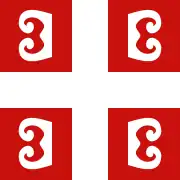| Total population | |
|---|---|
| 115,000-120,000 (estimate) | |
| Regions with significant populations | |
| Stockholm, Göteborg, Malmö | |
| Languages | |
| Serbian, Swedish | |
| Religion | |
| Serbian Orthodox Church | |
| Related ethnic groups | |
| Serbs in Norway, Serbs in Germany, Serbs in the Netherlands, Serbs in South Africa, Serbs in Australia |
| Part of a series on |
| Serbs |
|---|
 |
Serbs (Swedish: Serber) began migrating to Sweden in large numbers in the 1960s, as part of the migrant work-agreement signed with the Yugoslav government to help Sweden overcome its severe labour shortage. The Yugoslav Wars saw another influx of Serbs.
History
Serbs constituted a low percentage of the Swedish population prior to the 1960s. Some came after World War II, mostly seeking political asylum. The greatest proportion of Serbs came together with Greeks, Italians and Turks under the visa agreements in times of severe labour shortages or when particular skills were deficient within Sweden, as migrant workers (called arbetskraftsinvandring, see gastarbeiter).[1] During the 1960s and 1970s, agreements were signed with the government of Yugoslavia to help Sweden overcome its severe labour shortage.[2]
Bosnian and Croatian Serbs migrated in another wave during and after the Yugoslav wars. A third wave, of Kosovo Serbs, came during the Kosovo war in 1999.
Demographics
The Swedish census data includes country of birth, but does not include ethnicity, descendants or naturalized people, thus, the total number of ethnic Serbs in Sweden is hard to define. Various estimations include: 80,000;[3] 110,000;[4] 120,000;[5] and 140,000.[6] Aco Dragićević, writing for the Swedish-Serbian newspaper Dijaspora, wrote in 2002 that some 200,000 Yugoslavs, regardless of ethnic origin, migrated to Sweden during the Second Yugoslavia (1945-1992); of these, roughly 40% (ca. 80,000) he believed to be Serbs.[7]
Culture
Language
The Serbs in Sweden are bilingual. The Serbian language is a rich contributor to the so-called Rinkeby Swedish, a sociolect (slang) of the Swedish language.
Religion


In 1972, the first Serbian Orthodox parish (of St. Nicholas) was formed in Västerås, prior to the forming the Serbs were headed by Swedish Orthodox priest Christofer Klasson, previously priest in the Church of Sweden. Later, the same year a parish was formed in Malmö (of Saints Cyrils and Methodius) and in 1973 one in Stockholm (of Saint Sava). Later, parishes have been formed in Göteborg (of Stefan Decanski), Jönköping (of Nativity of Mary), Helsingborg (of St Basil the Great) and one more in Stockholm. The parishes have their own head-priest.
In Malmö in 1982, the Church of Saint Cyril and Methodius was opened, the first Serbian church in Sweden. The parish of Saint Sava opened its church in Enskede, in 1983, the parish in Göteborg also has a church.
The parish in Malmö suffered several attacks in 1990, the premises were firebombed but the church was not damaged, the perpetrators were racist youths who were later convicted of arson.[8]
The SOC has parishes and churches in the cities of:
- Stockholm (2)
- Church of Saint Sava
- Eskilstuna
- Västerås
- Göteborg
- Holy Stefan Decanski church
- Jönköping
- Kristianstad
- Helsingborg
- Holy Basil the Great church
- Malmö
- Church of Saints Cyril and Methodius
- Laholm
- Smedjeryd monastery[9]
Music
Stockholm-based Östblocket and Macedonian-Swedish Andra Generationen are both Balkan Brass Bands, playing a musical style from southern Serbia.
Sport
Swedish Serbs have been very successful in sports, among most notable are
The Stockholm Eagles is a Serbian-Swedish basketball team that has become very successful since its establishment in 2007. They won the Swedish second league (Basketettan) back to back 2011 and 2012 and became the only team in Sweden to win 34 victories in a row.[10]
Notable people
 |  |  |  |  |  |  |  | .JPG.webp) |  | .jpg.webp) |
- Sports
- Dalibor Doder, handball player[11]
- Bojan Djordjic, footballer (AIK, champion 09'), Serbian-born
- Alexander Kačaniklić, football player, paternal descent[12]
- Alexander Milošević, football player, Serbian father[13]
- Dusan Djuric, footballer (FC Zürich, champion 09')[14]
- Zoran Lukić, football manager (Djurgårdens IF, champions 02' and 03'), Bosnian-born
- Daniel Majstorović, footballer (FC Basel, champion 08')[15]
- Marko Mitrović, footballer[16]
- Nebojša Novaković, former footballer-assistant manager (AIK, champion 98'), Bosnian-born
- Nikola Pasic, ice hockey player, Serbian parents
- Peter Popovic, ice hockey player (NHL; Canadiens, Rangers, Penguins and Bruins), Serbian parents
- Rade Prica, footballer (Danish Superliga Top scorer: 06–07', Norwegian Premier League Top scorer: 09'), Serb father[17]
- Danijela Rundqvist, ice hockey player (Olympic Silver 2006, Bronze 2002), Kosovo Serb mother[18]
- Stefan Selaković, footballer (IFK Göteborg, champion 07')[19]
- Dragan Umicevic, ice hockey player (NHL; Oilers), Bosnian-born
- Ljubomir Vranjes, handball player and multiple champion[20]
- Tanja Kostić, basketball player[21]
- Robert Kronberg, hurdler, Serbian mother
- Susanne Nilsson, football player[22]
- TV and Music
- Alina Devecerski, singer, Serbian father[23]
- Oscar Dronjak, guitarist of power-metal band HammerFall[24]
- Katerina Kazelis, singer, Serbian mother
- Dragomir Mrsic, actor, Bosnian-born[25]
- Jovan Radomir, Swedish television presenter
- Michaela Savić, Swedish beauty pageant titleholder and model
- Sven Stojanović, television director, directed several Eurovision Song Contest
- Nikola Šarčević, punk rock musician
- Other
- Dragan Joksović, crime boss
- Ratko Đokić, crime boss
See also
References
- ↑ (in Swedish) Serbia Archived 2011-06-13 at the Wayback Machine Government Offices of Sweden.
- ↑ (in Swedish) "Historik" (History), Migrationsverket.
- ↑ Gunnar Sörbring (2003-09-26). "Serber oroliga för nyväckt avsky". Dagens Nyheter.
- ↑ Palić, Svetlana (17 July 2011). "Četiri miliona Srba našlo uhlebljenje u inostranstvu". Blic.
Švedskoj (110.000)
- ↑ "Sverige vill öppna Serbienförhandlingar" (in Swedish). SvD. 2015-02-02.
Det bor cirka 120 000 serber i Sverige.
- ↑ Ranko Pivljanin (24 November 2011). "Orlovi vladaju Švedskom". Blic.
- ↑ Aco Dragićević (5 October 2002). "Druga generacija iseljenika u Švedskoj". Srbi širom sveta. Dijaspora.
Što se tiče Švedske, zemlje u kojoj se poklanja velika pažnja statističkim podacima, nije teško saznati koliko je i(u)seljenika, ilustracije radi, stiglo iz Jugoslavije. Statistika u ovoj zemlji useljenike, međutim, prati po zemlji porekla, a ne po nacionalnoj pripadnosti. U ovdašnjoj literaturi koja se bavi useljenicima, mogu se naći procene švedskih sociologa - od ukupnog broja useljenika iz Jugoslavije 40% su Srbi. Statistički podaci govore da u Švedskoj živi oko 200 hiljada useljenika iz druge Jugoslavije.
- ↑ Sydsvenska Dagbladet 13/5, 8/6, 21/9, 31/10 and 1/11, 1990
- ↑ "Förstasidan". svt.se. Archived from the original on 2011-07-25.
- ↑ Stockholm White Eagles Archived 2010-10-24 at the Wayback Machine
- ↑ "Intervju nedelje – Dalibor Doder!". Balkan-Handball.com. Balkan Handball. 2008-04-30.
- ↑ "Kačaniklić: Otac me pitao da li želim da igram za Srbiju, odbio sam". Archived from the original on 2013-11-05.
- ↑ "Talangen vill till AIK – Vasalund säger nej". 19 January 2011.
- ↑ "Stjärna i FC Zürich: Dušan Djuric".
- ↑ "Backen som gjorde årets mål". Fotboll. Sydsvenskan. Archived from the original on 2016-03-04.
- ↑ "Srbi u tuđini". Sportal. July 26, 2010. Archived from the original on July 14, 2014.
- ↑ "Tidligere spiller: Rade Prica". RBKweb.
- ↑ "Danijela Rundqvist blog". 2012-09-01. Retrieved 14 February 2010.
- ↑ "Halmstad - de där bönderna". Aftonbladet.
- ↑ "Helgintervjun med Ljubomir Vranjes…". Handbollsbloggen. Archived from the original on 2016-03-04.
- ↑ "Hem från USA som stjärna. Serbiska Tanja från Täby ska skjuta Sverige vidare i EM". DN.SE.
- ↑ "Фудбалски савез Србије - званична веб презентација". fss.rs.
- ↑ "Intervju med Alina Devecerski". Elle. 2014-08-13.
- ↑ "Oscar! - Road 32". Lelle666. Archived from the original on 2016-03-04.
- ↑ "Gago Mrsic". Dijaspora. Vesti online.

